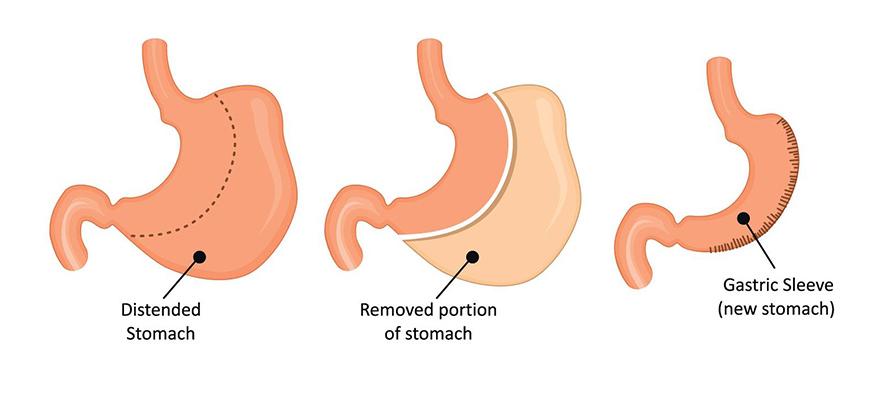When it comes to long-term weight loss solutions, gastric sleeve and gastric bypass are the two most popular surgical options available. Both procedures can help individuals struggling with obesity regain control of their health—but they work in different ways and are suited to different patient needs.
In this comprehensive guide, we’ll break down the differences between gastric sleeve and gastric bypass surgery, including how they work, expected weight loss, recovery, cost, and more. By the end, you’ll have a clearer understanding of which path might be right for you.
What Is Gastric Sleeve Surgery?
Gastric sleeve surgery, also known as vertical sleeve gastrectomy (VSG), involves permanently removing approximately 80% of the stomach. What remains is a small, tube-like “sleeve” that limits the amount of food you can consume.
This procedure is typically performed laparoscopically, meaning through small incisions using a camera and surgical instruments. Since it removes the portion of the stomach responsible for producing the hunger hormone ghrelin, it also helps reduce appetite and cravings.
What Is Gastric Bypass Surgery?
Gastric bypass, or Roux-en-Y gastric bypass, is a two-step procedure. First, the stomach is divided into a small upper pouch and a larger lower section. Then, the small intestine is rerouted to connect directly to the small pouch.
The result? A significantly reduced stomach capacity and a bypass of a portion of the digestive tract, which limits calorie and nutrient absorption. Gastric bypass can be performed laparoscopically or via open surgery, depending on the case.
Key Differences Between Gastric Sleeve and Gastric Bypass
| Feature | Gastric Sleeve | Gastric Bypass |
|---|---|---|
| Procedure Type | Part of the stomach removed | Stomach divided + intestine rerouted |
| Invasiveness | Less invasive | More complex |
| Hormonal Effect | Ghrelin (hunger hormone) reduced | Alters gut hormone response |
| Digestive Tract | Intact | Partially bypassed |
| Reversibility | Not reversible | Not reversible |
| Risk Level | Lower | Slightly higher |
Weight Loss Results: What Can You Expect?
Both surgeries are highly effective, but outcomes vary slightly:
Gastric Sleeve
Average excess weight loss: 60–70%
Weight loss pace: Steady over 12–18 months
Long-term maintenance: Depends on lifestyle
Gastric Bypass
Average excess weight loss: 66–80%
Weight loss pace: Faster in first 12 months
Better outcomes for severe obesity or GERD
For a deeper look into this topic, check our detailed comparison: Gastric Sleeve vs. Gastric Bypass
Recovery and Side Effects
Gastric Sleeve Recovery
Hospital stay: 1–2 days
Return to normal activity: 2–4 weeks
Common side effects: Nausea, fatigue, minor incision pain
Possible long-term issues: Acid reflux, vitamin deficiencies
Gastric Bypass Recovery
Hospital stay: 2–3 days
Return to normal activity: 3–6 weeks
Common side effects: Dumping syndrome, diarrhea, fatigue
Long-term risks: Malabsorption, ulcers, strict nutritional guidelines
Cost Comparison: Gastric Sleeve vs. Bypass
In countries like the U.S., these procedures can be prohibitively expensive without insurance:
| Surgery Type | U.S. Cost Range |
| Gastric Sleeve | $7,000 – $25,000 |
| Gastric Bypass | $10,000 – $25,000 |
In contrast, Turkey offers world-class care at more affordable rates:
Gastric Sleeve in Istanbul: $2,500 – $3,500
Gastric Bypass in Istanbul: $3,500 – $4,500
These all-inclusive packages often cover hospital stay, pre-op tests, translation services, and more.
Learn more about our Gastric Sleeve surgery in Istanbul.
Who Is a Good Candidate for Each Surgery?
Gastric Sleeve
BMI over 40 or BMI over 35 with obesity-related conditions
No severe acid reflux
Prefer a simpler, less invasive option
Gastric Bypass
BMI over 40 or BMI over 35 with diabetes or severe reflux
Failed previous weight loss surgeries
Require faster weight loss or have metabolic conditions
A thorough evaluation by a bariatric specialist is essential for deciding the most appropriate option.
Gastric Sleeve vs. Bypass: Which One Should You Choose?
There’s no universal “best” option. The right choice depends on:
Your current health conditions
Desired weight loss rate
Willingness to manage side effects
Previous surgery history
If you’re looking for a less invasive option with a more gradual weight loss and fewer nutritional risks, gastric sleeve may be ideal. If you’re seeking faster results or have complex health issues like GERD or type 2 diabetes, gastric bypass might offer more benefits.
Why Many Patients Choose Turkey for Bariatric Surgery
Thousands of patients around the world travel to Turkey for safe, effective, and affordable bariatric procedures. Why?
Internationally trained, experienced surgeons
Modern, accredited hospitals
Personalized all-inclusive packages
Short waiting times
Significant cost savings vs. the U.S. and Europe
Final Thoughts
Whether you’re leaning toward gastric sleeve or gastric bypass, both offer life-changing benefits when paired with a healthy lifestyle and proper medical support. Take the time to consult with a bariatric expert to explore which procedure best fits your goals.
And if you’re considering safe and cost-effective bariatric surgery abroad, Turkey—particularly Istanbul—offers one of the best destinations to begin your journey.




